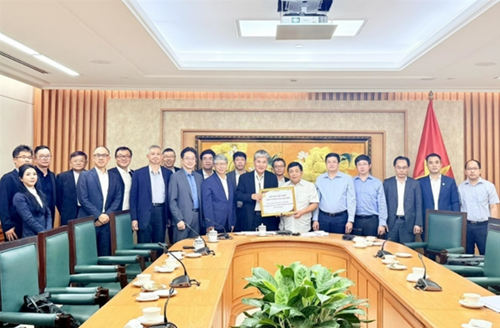At the meeting, the two sides discussed ways to enhance cooperation and promote the establishment of major research and development (R&D) centers and semiconductor research facilities in Vietnam.
Chairman of the council Hong-Yuan Lee briefed Deputy PM Dung on the progress made following his suggestions during a meeting held in May 2025. He said the council has assembled a list of 16 prominent experts, scholars, and corporate leaders with extensive experience in Taiwan’s high-tech and semiconductor sectors.
    |
 |
|
Deputy Prime Minister Nguyen Chi Dung holds a working session with the Business Council for Sustainable Development of Taiwan (China) in Hanoi on Wednesday. |
This advisory group includes former top executives of leading global semiconductor and technology corporations, researchers from prestigious universities and institutes in the U.S. and Taiwan (China), and specialists in areas such as chip design, fabrication, artificial intelligence, quantum technology and smart manufacturing.
Vice Chairman of the council Konrad Young added that 100 scholarships would be offered this year to outstanding Vietnamese managers, experts, lecturers, postgraduate researchers and students working or studying in semiconductor-related fields. The scholarship program is expected to run in three to four phases, with the first scheduled for September 2025 during the SEMICON Taiwan 2025 exhibition.
Deputy PM Dung commended the council for swiftly advancing cooperation plans following their previous meeting. He affirmed that Vietnam has created the most favorable policy mechanisms and ecosystem to support the semiconductor industry, with human resources being the country’s strongest asset.
He stressed the firm and long-term commitment of the Party and Government of Vietnam to developing the semiconductor industry. He emphasized that Vietnam has a clear strategy and ambition in this field, and is rapidly emerging as a central hub and key link in the regional and global semiconductor value chains.
The Deputy PM called for greater international support, particularly drawing on the valuable expertise of Taiwan’s specialists.
He assigned the Ministry of Finance to work on a detailed action plan to realize specific cooperation projects with the council, including coordinating preparations for the expert group to begin formal advisory activities in Vietnam.
The official suggested initial areas of focus such as completing and implementing a national semiconductor development strategy; attracting foreign investment in high-tech and semiconductor sectors; and promoting technology transfer across different stages of the semiconductor supply chain, especially through the development of R&D centers, laboratories and joint research initiatives.
He also proposed strengthening cooperation with the council to establish major R&D centers and research facilities in Vietnam to support innovation, training and technology transfer in the semiconductor field.
Source: VNA